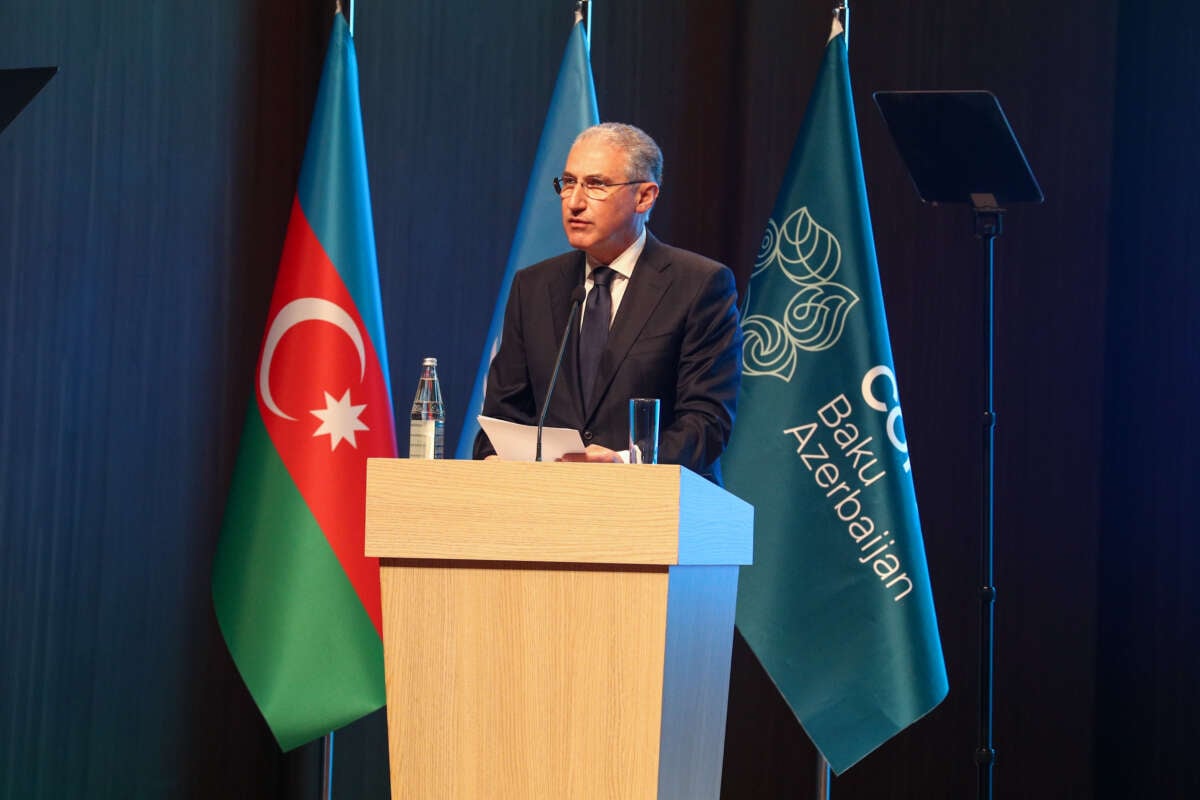Did you know that Truthout is a nonprofit and independently funded by readers like you? If you value what we do, please support our work with a donation.
Human Rights Watch on Thursday revealed the host country agreement between the United Nations and Azerbaijan for next month’s climate summit, on the heels of an HRW report exposing “the government’s concerted efforts to decimate civil society and silence its critics.”
COP29 is scheduled for November 11-22 in Baku. Although the agreement was signed in August by U.N. Framework Convention on Climate Change (UNFCCC) Executive Secretary Simon Stiell and Mukhtar Babayev, Azerbaijan’s minister of ecology and natural resources, it was not made public until the U.S.-based human rights group obtained a copy.
Myrto Tilianaki, senior advocate for HRW’s environment and human rights division, said it “is disappointing but not surprising” that the 20-page document “is replete with significant shortcomings and ambiguities on the protections for participants’ rights.”
As Tilianaki detailed in a Thursday dispatch on the HRW website:
For instance, the agreement states that while conference participants “shall enjoy immunity for legal process in respect of words spoken or written and any act performed by them,” a separate clause requires them to respect Azerbaijani laws and not interfere in its “internal affairs.”
There is no clarity in the agreement about what actions could constitute “interference” with Azerbaijan’s “internal affairs,” and whether Azerbaijan’s laws apply in the U.N.-run conference zone. Given Azerbaijan’s strict limitations on freedoms of expression and assembly, which violate international human rights law, participants’ actions within the zone could be subject to reprisals outside the zone.
Tilianaki cited HRW and Freedom Now’s Tuesday report, ‘We Try to Stay Invisible’: Azerbaijan’s Escalating Crackdown on Critics and Civil Society, which states that the Caucasus country “has had a poor human rights record for many years, with the government regularly targeting those who play important watchdog roles in society, including human rights defenders, journalists, and independent civic activists.”
“The government’s vicious crackdown on critics and dissenting voices intensified over the last two years,” the report emphasizes. “Among the methods the government uses to target these individuals are arrests and prosecutions on politically motivated, bogus criminal charges, as well as the arbitrary enforcement of highly restrictive laws regulating nongovernmental organizations. This system effectively excludes independent activists and media from lawful ways of carrying out their work, thereby pushing them to the margins of the law and heightening their vulnerability to retaliatory criminal prosecution.”
“Azerbaijan is rich in oil and natural gas, depends heavily on fossil fuels for its state budget, and in 2024 is also hosting COP29, the United Nations Climate Conference,” the 74-page document adds. “In the months leading up to COP29, Azerbaijani authorities have arrested dozens of prominent activists and media figures on baseless, serious criminal charges. The arrests are overwhelmingly linked to highly restrictive laws on nongovernmental organizations.”
COP29 continues a trend in which a country hosts a summit that is supposed to bring world leaders together to tackle the climate emergency despite being incredibly involved with fossil fuels and repressive of critics — as Alex Galitsky of the Armenian National Committee of America wrote in a Thursday opinion piece for The Hill, “letting Azerbaijan host the U.N. climate conference is a sick joke.”
Civil society groups, Tilianaki noted, “have repeatedly called for host country agreements to be made public for participants to have confidence that their rights will be protected when attending climate conferences,” pointing out that Amnesty International obtained a copy of the last year’s agreement only months after the United Arab Emirates hosted COP28.
As Amnesty explained in July, “In 2023 conclusions of the Bonn Climate Conference, parties to the UNFCCC highlighted that host countries should reaffirm their commitment to upholding the purposes and principles of the Charter of the United Nations and international human rights law before, during and after UNFCCC sessions and mandated events, and to ensure that participants can exercise those human rights without fear of intimidation and repercussions.”
Although the COP28 agreement “contains some positive elements,” Amnesty said, the 2023 conclusions “were not implemented” in the document. The group detailed various “elements of concern” and published the full text. It has also documented the history of human rights abuses in Azerbaijan.
Tilianaki declared Thursday that “it is regrettable that these agreements are shrouded in secrecy, and it shouldn’t fall to civil society organizations to share them publicly.”
“In the interests of transparency and accessibility, the UNFCCC should publish past, current, and future agreements on its website,” she said. “More urgently, it should publicly call upon the Azerbaijani government to respect its human rights obligations and facilitate a rights-respecting climate conference.”
Trump is silencing political dissent. We appeal for your support.
Progressive nonprofits are the latest target caught in Trump’s crosshairs. With the aim of eliminating political opposition, Trump and his sycophants are working to curb government funding, constrain private foundations, and even cut tax-exempt status from organizations he dislikes.
We’re concerned, because Truthout is not immune to such bad-faith attacks.
We can only resist Trump’s attacks by cultivating a strong base of support. The right-wing mediasphere is funded comfortably by billionaire owners and venture capitalist philanthropists. At Truthout, we have you.
We’re in the midst of a fundraiser, and as of right now, we have until midnight to raise $10,000. Please take a meaningful action in the fight against authoritarianism: make a one-time or monthly donation to Truthout. If you have the means, please dig deep.
